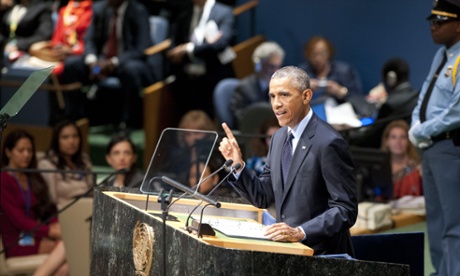More than 300,000 people marched in New York a week ago, with tens of thousands more in cities across the globe. More than 120 heads of state and government convened in New York, renewing their commitment to a global climate deal to be forged next year. France pledged $1bn in climate aid to poor countries, followed by several others. And a group of banks, pension funds and insurers promised investments of $200bn in low-carbon ventures in the next year.
But behind the impressive headline figures, the true story of ‘Climate Week’ shows a more complex picture.
Barack Obama’s speech was long on rhetoric, but its main new commitment was to take climate change into account in overseas aid spending. China, whose per capita emissions overtook those of Europe last year, repeatedly insisted that it need not take on similar emissions-reduction commitments to those of developed nations.
“China is a developing country,” said Xie Zhenhua, vice-chairman of China’s National Development and Reform Commission. “[We have] 18m people living in poverty. That is why China has paid equal attention to to growth, mitigation [of emissions] and adaptation [to climate change]. That is similar to other developing countries, and the least developing countries. We are on the same page as these countries.”
That repetition of China’s long-time stance may not bode well for the negotiations in the next year, leading up to a crunch conference in Paris next December, at which world governments are supposed to sign a new agreement on greenhouse gas emissions, to take effect from 2020.
The news from investors, despite the happy headlines, was also mixed.
While $200bn funding for low-carbon projects was pledged by a group of financial institutions, elsewhere fossil fuels were alive and well. Roland Busch, chief executive of the infrastructure sector at Siemens, the industrial multinational, said any notion of pulling out of fossil fuels would be “really long term”, and refused to put a date on when that might be, saying instead that fossil fuels such as coal were still needed as a back-up to renewable energy.
Fossil fuel companies are still in it for the long term. As the Financial Times and Guardian has reported, this year ExxonMobil and Shell both wrote to investors to say that their fossil fuel businesses would stay strong for decades, even if governments take action on climate change.
Investing in fossil fuels not only perpetuates existing high-carbon infrastructure, but it uses up money and attention that could have been directed to low-carbon ends.
Louise Hutchins of Greenpeace said: “The huge amounts of coal burnt by the big energy companies isn’t just damaging our health and climate, it’s also sucking oxygen out of the clean tech sector.”
Often, the same companies – like Siemens, its rivals General Electric, Mitsubishi and others – that are dependent on fossil fuel revenues are the biggest investors in renewable technologies such as wind turbines.
It is hard to see how both propositions can be true: that the world is gearing up to tackle climate change, and that there are long-term profits to be had from exploiting our remaining fossil fuels.
Many political leaders, including the UN climate envoy Mary Robinson, and scientists including the Intergovernmental Panel on Climate Change, now accept that much of the world’s stock of fossil fuel must remain in the ground, if we are to avoid pouring so much carbon into the atmosphere that we tip over the crucial 2C threshold. Warming of more than 2C above pre-industrial averages is likely to lead to severe and irreversible effects on the climate, including sea level rises, droughts, floods, heatwaves and extreme weather.
As Graca Machel, the widow of Nelson Mandela, declared in the most rousing speech of the summit, left to the very end: “There is a huge mismatch between the magnitude of the challenge and the response we heard here today. The scale is much more than we have achieved.”
She urged nations to go back to the drawing board, working out how much carbon we can still afford to emit and finding ways to ensure that we do not, cumulatively and collectively, exceed that limit.
For that to happen, fossil fuel investors would have to accept that their future profits are limited, too. There was no sign of that in New York.

